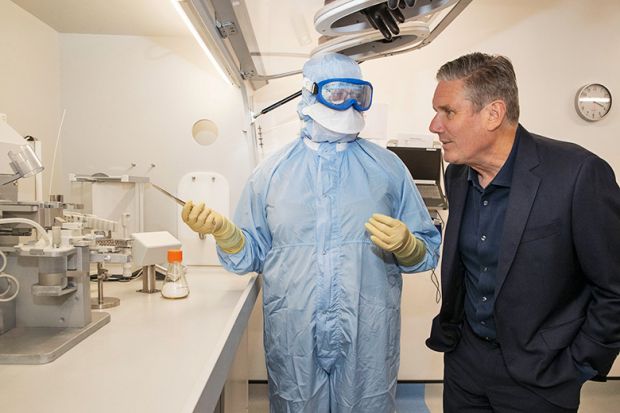Increased efforts to highlight the importance of quality-related (QR) research funding have raised concerns that the £2 billion a year income stream could face substantial cuts – a move likely to worsen the stricken finances of the UK’s research-intensive universities.
The Russell Group has become the latest body to flag the importance of QR funding in its submission to the government’s Comprehensive Spending Review, stressing its role in allowing universities to “pursue innovative and high-risk, high-reward research, and ensure the UK’s research base remains agile and responsive”.
It follows Universities UK’s recent call for a “sustained real terms increase” in QR, which it said had fallen by about 15 per cent in real terms since 2010.
Imperial College London’s president Hugh Brady also used a speech to praise the role of QR funding in UK science, saying most of the country’s research strengths “can in large part be explained by the flexibility QR funding gives researchers”.
However, the freedom of universities to spend their QR block grants – which are awarded based on their performance in the Research Excellence Framework – and the absence of any mechanism to evaluate the effectiveness of this spending are known to have infuriated officials in Whitehall and UK Research and Innovation (UKRI).
“No one will publicly say it but there is definitely frustration at some research councils about QR – it’s useful to have this kind of flexible funding but we just don’t know if it’s being spent wisely or not,” one source told Times Higher Education, adding: “That’s a real issue when QR is about a quarter of UKRI’s annual budget.”
With UKRI’s chief executive Ottoline Leyser predicting a “tight” settlement when its 2025-26 budget is announced in the next few weeks, there are now concerns that QR could be hit harder than other funding streams in light of the uncertainty over whether it delivers demonstrable returns in its own right.
Both the Russell Group and Universities UK have recently begun to address this perceived lack of information on the benefits of QR by flagging several high-profile projects supported by it. According to the Russell Group’s submission to the Comprehensive Spending Review, QR allowed Sarah Gilbert’s lab at the University of Oxford’s Jenner Institute to pivot its vaccine research to focus on Covid, while every £1 of QR funding at Imperial led to more than £5 in matched private investment.
“Without QR funding, and its equivalents in the devolved nations, we would not have had innovations and discoveries such as graphene, genomics, opto-electronics, cosmology research, and new tests and treatments for everything from bowel disease to diabetes, dementia and cancer,” the Russell Group adds in its submission.
It also notes how QR is a “cost-effective way of funding research” with administration costs of the REF amounting to about 3-4 per cent of allocation costs.
Stephanie Smith, deputy director of policy at the Russell Group, said QR plays a “unique role in enabling universities to support their researchers, deliver long-term strategic projects and pursue high-risk, high-reward research”.
“It also underpins vital innovation activity, particularly in areas still emerging as the major global challenges of the future”, she continued, adding that the group was seeking “measures that address the decline in the value of QR funding and prevent future erosion, to make sure the UK’s research base is robustly supported to deliver on government priorities”.
In light of concerns over how QR funds are spent, Research England has already commissioned an independent evaluation of its Strategic Institutional Research Funding, which includes all types of QR funding, with RSM UK Consulting and RAND Europe set to deliver their findings later this year.
That would appear to chime with what science minister Patrick Vallance told a parliamentary committee on 11 February, that he wanted “much more clarity on return on investment” for public science spending. A day later his Department for Science, Innovation and Technology unveiled a new evaluation strategy in which “evaluation is integral to impactful decision-making”.
In his 90-minute appearance before MPs, Vallance spoke at length about the importance of protecting “basic, curiosity-driven, investigator-led research” which he said was the “thing that lays the golden egg” but did not explicitly mention QR funding for universities.
Register to continue
Why register?
- Registration is free and only takes a moment
- Once registered, you can read 3 articles a month
- Sign up for our newsletter
Subscribe
Or subscribe for unlimited access to:
- Unlimited access to news, views, insights & reviews
- Digital editions
- Digital access to THE’s university and college rankings analysis
Already registered or a current subscriber?








